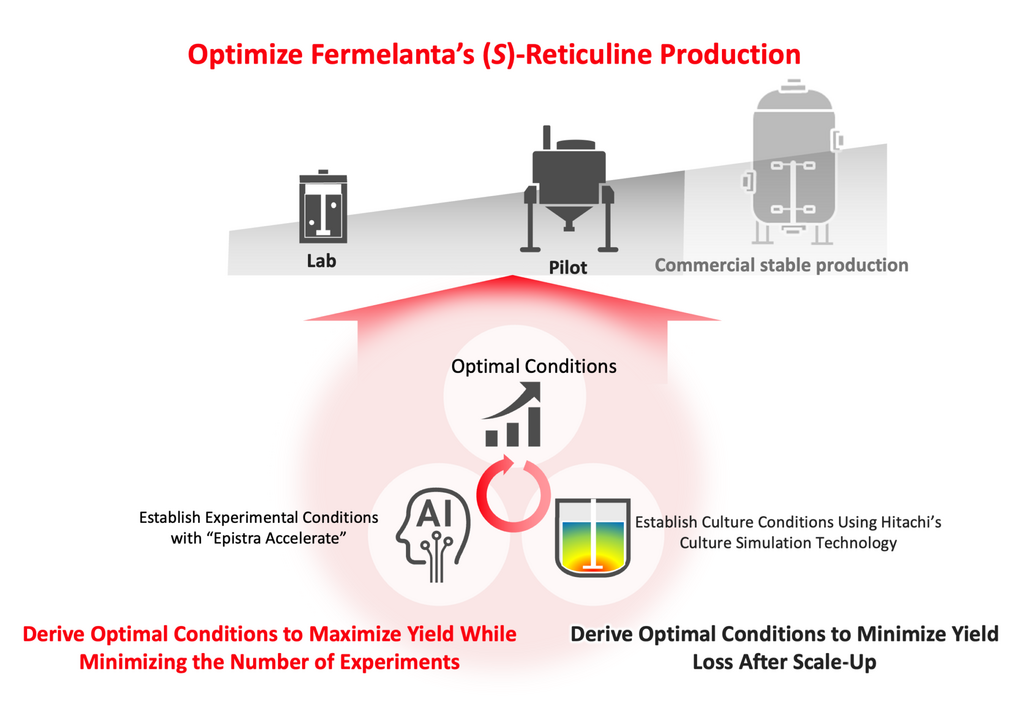Epistra and Hitachi leverage AI to achieve one of the world’s largest yields and up to a 73% reduction in lab experiment iterations in the production of “(S)-Reticuline,” a pharmaceutical intermediate from Fermelanta
Epistra and Hitachi leverage AI to achieve one of the world’s largest yields and up to a 73% reduction in lab experiment iterations in the production of “(S)-Reticuline,” a pharmaceutical intermediate from Fermelanta
By fiscal year 2025, we will conduct pilot-scale demonstrations to suppress yield reduction after scale-up.

Overview of initiatives toward commercial production of the (S)-Reticuline
Tokyo, Japan — November 27, 2025 — Epistra Inc. (“Epistra”) , Hitachi, Ltd. (“Hitachi”) and Fermelanta Inc. (“Fermelanta”) have completed a first phase of lab-scale*1 joint proof-of-concept*2 in October. This initiative aims to address challenges in establishing microbial culture conditions for producing “(S)-Reticuline”*3, a pharmaceutical intermediate used in the production process of anticancer substances and other compounds.
This proof-of-concept aims to seamlessly optimize the production process of the pharmaceutical intermediate from lab scale to pilot scale*4 by combining Epistra’s AI-based experimental condition optimization with Hitachi’s culture simulation technology, thereby minimizing yield loss during scale-up.
In this lab-scale demonstration, Fermelanta, Hitachi and Epistra carried out culture experiments using Fermelanta’s proprietary smart cells*5. Hitachi and Epistra, under conditions designed with scale-up in mind, utilized AI-based parameter optimization technology through “Epistra Accelerate” to identify the optimal conditions from an enormous set of approximately 4,300 trillion combinations of 11 variables (such as temperature, pH, aeration rate, and media components) in just 60 experiments. As a result, the yield of (S)-Reticuline increased from 3.2 g/L to 6.0 g/L, and the number of lab experiments was reduced by up to 73% compared to conventional methods*6.
This initiative demonstrates an integrated process combining “AI × Simulation × Smart Cells” and has achieved one of the world’s highest yields*7 for microbial-based bioproduction. (S)-Reticuline serves as an intermediate for various pharmaceuticals, and the yield achieved here enables cost-effective production of these compounds.
Fermelanta, Hitachi and Epistra plan to carry out pilot-scale*4 demonstrations in fiscal year 2025 to minimize yield loss during scale-up.
For more information, refer to https://www.hitachi.com/New/cnews/month/2025/11/251127a.html
*1 Lab scale: An experimental scale using culture vessels with volumes ranging from a few milliliters to several liters.
*2 Part of the demonstration experiment is being conducted under the Ministry of Agriculture, Forestry and Fisheries’ Small and Medium Enterprise Innovation Creation Promotion Project (SBIR Phase 3).
*3 (S)- Reticuline: In the pharmaceutical manufacturing process, which consists of stages from raw materials → intermediates → active pharmaceutical ingredient (API) → pharmaceutical formulation, (S)-Reticuline falls under the “intermediate” category. It is an intermediate product used to synthesize the final active ingredient (API). Intermediates play a critical role in process development to ensure stable quality and yield. In particular, in the synthetic pathways of anticancer drugs and analgesics, passing through (S)-Reticuline enables efficient production.
*4 Pilot-scale: A test production scale positioned between laboratory scale and full-scale commercial production.
*5 Smart cell: A cell engineered with multiple genetic modifications to enhance specific functions.
*6 Basis for 73% reduction: The reduction rate in the number of experiments is based on a comparison with the required number of trials under a representative classical experimental design method (Box–Behnken design). For 11 factors with one center point, this method requires 221 trials. In this study, optimal conditions were identified in 60 trials, resulting in a reduction of approximately (221−60)/221 ≈ 73%.
*7 Basis for “one of the world’s largest”: According to the latest published academic papers, the yield of (S)-Reticuline using yeast in a 3 L lab-scale culture vessel is reported to be 4.6–4.8 g/L, and no subsequent reports exceeding this yield at lab scale have been confirmed. Therefore, the results achieved here are considered among the world’s largest yields to date.
- Pyne, Michael E., et al. “A yeast platform for high-level synthesis of tetrahydroisoquinoline alkaloids.” Nature Communications 11.1 (2020): 3337.
- Narcross, Lauren, et al. “Benzylisoquinoline alkaloid production in yeast via norlaudanosoline improves selectivity and yield.” bioRxiv (2023): 2023-05.
About Hitachi, Ltd.
Through its Social Innovation Business (SIB) that brings together IT, OT(Operational Technology) and products, Hitachi contributes to a harmonized society where the environment, wellbeing, and economic growth are in balance. Hitachi operates globally in four sectors – Digital Systems & Services, Energy, Mobility, and Connective Industries – and the Strategic SIB Business Unit for new growth businesses. With Lumada at its core, Hitachi generates value from integrating data, technology and domain knowledge to solve customer and social challenges. Revenues for FY2024 (ended March 31, 2025) totaled 9,783.3 billion yen, with 618 consolidated subsidiaries and approximately 280,000 employees worldwide. Visit us at www.hitachi.com.
About Fermelanta, Inc.
Fermelanta Inc. is a synthetic biology startup founded in 2022. With approximately 35 R&D members and around 10 business and operations members, the company has built a proprietary technological platform for the fermentation-based production of high-value compounds—such as pharmaceuticals, cosmetic ingredients, and food additives—using engineered E. coli. Through this fermentation platform, we design and manufacture a wide range of scalable metabolites, including alkaloids, flavonoids, and carotenoids, enabling an integrated workflow from early research to commercial manufacturing. To date, we have raised and secured over 4 billion yen in combined funding and grants, and under the mission of “delivering effective ingredients to everyone,” we are driving the societal implementation of sustainable bio-based production.
About Epistra Inc.
Epistra is an AI solutions company that supports research and development in the life sciences, including pharmaceutical process optimization and biological manufacturing.
Leveraging proprietary technologies such as the experimental-design optimization AI “Epistra Accelerate” and the image-analysis AI “Epistra Vision,” Epistra provides hands-on, collaborative support services to accelerate experimental workflows and data-driven research.
With more than 60 successful projects across the life sciences industry, Epistra has demonstrated its ability to enhance R&D efficiency and reproducibility.
In collaboration with RIKEN, Epistra achieved over an 80% improvement in the differentiation efficiency of retinal pigment epithelial cells—results that were published in the international scientific journal eLife.
Visit us at https://epistra.jp/en.
